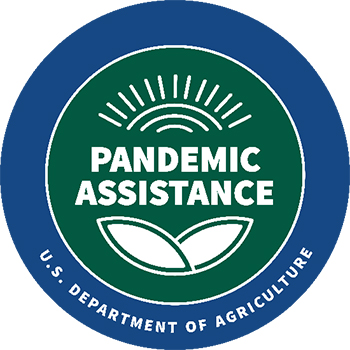USDA Pandemic Assistance to distribute resources more equitably
Apr 12, 2021

The U.S. Department of Agriculture is establishing new programs and efforts to bring financial assistance to farmers, ranchers, and producers who felt the impact of COVID-19 market disruptions. The new initiative — USDA Pandemic Assistance for Producers — will reach a broader set of producers than in previous COVID-19 aid programs. The department will also develop rules for new programs that will put a greater emphasis on outreach to small and socially disadvantaged producers, specialty crop and organic producers, and timber harvesters, as well as provide support for the food supply chain and producers of renewable fuel, among others. Existing programs like the Coronavirus Food Assistance Program (CFAP) will fall within the new initiative and, where statutory authority allows, will be refined to better address the needs of producers.
USDA reopened sign-up for CFAP 2 for at least 60 days beginning April 5, 2021. The USDA Farm Service Agency (FSA) has committed at least $2 million to establish partnerships with organizations with strong connections to socially disadvantaged communities to ensure they are informed and aware of the application process for CFAP 2 and other FSA programs. Organizations can visit farmers.gov/pandemic-assistance to learn more and submit a cooperative agreement proposal by May 5.
The Consolidated Appropriations Act, 2021, enacted December 2020 requires FSA to make certain payments to producers. This includes:
• An increase in CFAP 1 payment rates for cattle. FSA is automatically issuing these payments. Depending on how producers filed the original application, they may be asked for additional information.
• Information on the additional payment rates for cattle can be found on farmers.gov/cfap. Eligible producers do not need to submit new applications, since payments are based on previously approved CFAP 1 applications.
• Additional CFAP assistance of $20 per acre for producers of eligible crops identified as CFAP 2 flat-rate or price-trigger crops beginning in April. This includes alfalfa, corn, cotton, hemp, peanuts, rice, sorghum, soybeans, sugar beets and wheat, among other crops. FSA will automatically issue payments to eligible price trigger and flat-rate crop producers based on the eligible acres included on their CFAP 2 applications. Eligible producers do not need to submit a new CFAP 2 application. For a list of all eligible row-crops, visit farmers.gov/cfap.
• USDA will finalize routine decisions and minor formula adjustments on applications and begin processing payments for certain applications filed as part of the CFAP Additional Assistance program in the following categories:
o Applications filed for pullets and turfgrass sod;
o A formula correction for row-crop producer applications to allow producers with a non-Actual Production History (APH) insurance policy to use 100 percent of the 2019 Agriculture Risk Coverage-County Option (ARC-CO) benchmark yield in the calculation; and
o Sales commodity applications revised to include insurance indemnities, Noninsured Crop Disaster Assistance Program payments, and Wildfire and Hurricane Indemnity Program Plus payments.
USDA Pandemic Assistance for Producers includes investing $6 billion to expand help and assistance to more producers and adding $500 million of new funding to existing programs.
Please visit farmers.gov/cfap to learn more about the Coronavirus Food Assistance Program and farmers.gov/pandemic-assistance for additional information and announcements under the USDA Pandemic Assistance for Producers initiative.
For more content like this, check out to April issues of the Cooperator.
USDA reopened sign-up for CFAP 2 for at least 60 days beginning April 5, 2021. The USDA Farm Service Agency (FSA) has committed at least $2 million to establish partnerships with organizations with strong connections to socially disadvantaged communities to ensure they are informed and aware of the application process for CFAP 2 and other FSA programs. Organizations can visit farmers.gov/pandemic-assistance to learn more and submit a cooperative agreement proposal by May 5.
The Consolidated Appropriations Act, 2021, enacted December 2020 requires FSA to make certain payments to producers. This includes:
• An increase in CFAP 1 payment rates for cattle. FSA is automatically issuing these payments. Depending on how producers filed the original application, they may be asked for additional information.
• Information on the additional payment rates for cattle can be found on farmers.gov/cfap. Eligible producers do not need to submit new applications, since payments are based on previously approved CFAP 1 applications.
• Additional CFAP assistance of $20 per acre for producers of eligible crops identified as CFAP 2 flat-rate or price-trigger crops beginning in April. This includes alfalfa, corn, cotton, hemp, peanuts, rice, sorghum, soybeans, sugar beets and wheat, among other crops. FSA will automatically issue payments to eligible price trigger and flat-rate crop producers based on the eligible acres included on their CFAP 2 applications. Eligible producers do not need to submit a new CFAP 2 application. For a list of all eligible row-crops, visit farmers.gov/cfap.
• USDA will finalize routine decisions and minor formula adjustments on applications and begin processing payments for certain applications filed as part of the CFAP Additional Assistance program in the following categories:
o Applications filed for pullets and turfgrass sod;
o A formula correction for row-crop producer applications to allow producers with a non-Actual Production History (APH) insurance policy to use 100 percent of the 2019 Agriculture Risk Coverage-County Option (ARC-CO) benchmark yield in the calculation; and
o Sales commodity applications revised to include insurance indemnities, Noninsured Crop Disaster Assistance Program payments, and Wildfire and Hurricane Indemnity Program Plus payments.
USDA Pandemic Assistance for Producers includes investing $6 billion to expand help and assistance to more producers and adding $500 million of new funding to existing programs.
Please visit farmers.gov/cfap to learn more about the Coronavirus Food Assistance Program and farmers.gov/pandemic-assistance for additional information and announcements under the USDA Pandemic Assistance for Producers initiative.
For more content like this, check out to April issues of the Cooperator.